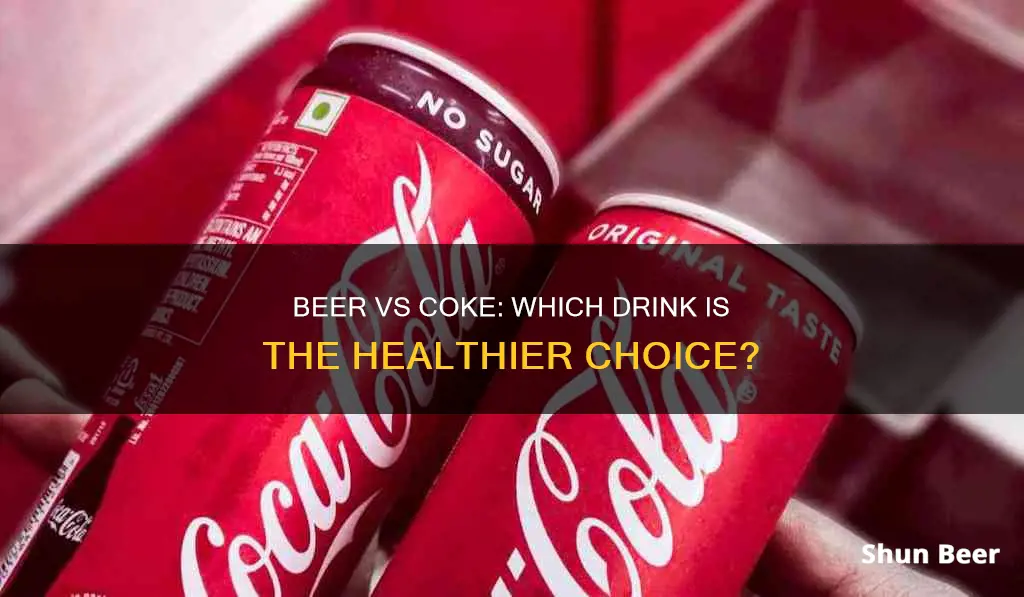
Beer or Coke: which is healthier? Both drinks have their pros and cons, and while one may be better for you in some ways, the other may be preferable in others. For example, while beer has a lower glycemic index than Coke, it also has more calories. So, which is better for you?
What You'll Learn
- Calories: Beer has fewer calories than Coke
- Nutrition: Coke has no nutritional value, whereas beer has trace amounts of vitamins and minerals
- Glycaemic Index: Coke has a much higher GI than beer, meaning it raises blood sugar levels faster
- Health Risks: Coke is linked to weight gain, diabetes, and fatty liver disease. Excessive beer consumption leads to liver disease and other health issues
- Addictive Properties: Both Coke and beer are addictive and cause a release of endorphins in the brain

Calories: Beer has fewer calories than Coke
Beer and Coke are two of the most popular beverages globally, but which is healthier in terms of calorie content? While both drinks have their pros and cons, beer may have a slight edge when it comes to calorie count.
Firstly, it's important to understand that the calorie content of beer and Coke can vary depending on the specific brand and type. However, on average, a 12-ounce serving of regular beer contains approximately 100 to 150 calories. In comparison, a 12-ounce can of standard Coke typically contains about 140 to 170 calories. So, right off the bat, we can see that beer generally has a lower calorie count.
Let's break this down further. Light beers, which typically have a lower alcohol content, usually fall in the range of 90 to 100 calories per 12-ounce serving. On the other hand, regular beers with a moderate alcohol content will bump the calories up to 140 to 180 per can. So, if you're watching your calorie intake, opting for a light beer over a regular beer can be a wiser choice.
Now, let's compare that to Coke. A standard can of Coke, as mentioned, contains around 140 to 170 calories. But it's important to note that these calories come mostly from sugar. A single can of Coke can pack in about 39 grams of sugar, which equates to a whopping 9 teaspoons! This far exceeds the recommended daily sugar intake for women (25 grams) and men (36 grams) set by the American Heart Association (AHA). So, if you're watching your waistline and overall health, the high sugar content of Coke can be a red flag.
In contrast, beer contains very little sugar. On average, a 12-ounce serving of regular beer will only give you around 1 to 2 grams of sugar. Even some craft beers or specialty beers with added ingredients, like fruit beers, will only have slightly more sugar. So, if you're trying to cut down on sugar, beer is definitely the better option between the two.
It's worth noting that diet sodas, which are artificially sweetened, can be a lower-calorie alternative to regular Coke. However, studies have linked these artificially sweetened drinks to potential negative health effects, such as an increased risk of metabolic syndrome and cardiovascular disease. So, while they may cut down on calories, they might come with their own set of health risks.
In conclusion, when it comes to calories, beer generally has the upper hand over Coke. However, it's important to remember that excessive consumption of either beverage can lead to weight gain and other health issues. As with everything, moderation is key. Enjoy your beer or Coke in moderation and be mindful of your overall health and fitness goals.
Sour Berry Beers: Healthy or Not?
You may want to see also

Nutrition: Coke has no nutritional value, whereas beer has trace amounts of vitamins and minerals
Coke and beer are both unhealthy drinks that can have detrimental effects on the body. However, when it comes to nutrition, coke has zero nutritional value, whereas beer has trace amounts of vitamins and minerals.
Coke is essentially liquid candy, packed with sugar and offering no health benefits whatsoever. It is often referred to as a "sugar drink" and contains no vitamins or minerals. On the other hand, beer, although not a significant source of nutrients, does provide some vitamins and minerals. According to the U.S. Department of Agriculture (USDA), beer can provide thiamin, riboflavin, niacin, vitamin B-6, follate, and vitamin B-12. Beer also has higher potassium content and antioxidants than coke.
Beer also has the advantage of having no fat or sugar. While it does contain a small amount of residual sugar from the fermentation process, it is not nearly as high as the amount found in coke. Most of the sugar in beer comes from the natural sugars in the grains used during brewing, and during fermentation, yeast consumes much of this sugar. As a result, the final sugar content of beer is relatively low.
In terms of calories, beer and coke are quite similar. A standard 12-ounce can of beer contains approximately 100-150 calories, while a 12-ounce can of coke typically contains around 140-170 calories. However, it is important to note that the calorie content of beer can vary depending on the type, with light beers having lower calorie counts and specialty beers having higher counts.
While both drinks can be harmful if consumed in excess, when it comes to nutrition, beer has a slight edge over coke due to its trace amounts of vitamins, minerals, and lower sugar content. However, it is important to remember that neither drink can be considered truly healthy, and excessive consumption of either can lead to health issues.
Beer's Healthy Bacteria: Fact or Fiction?
You may want to see also

Glycaemic Index: Coke has a much higher GI than beer, meaning it raises blood sugar levels faster
The Glycemic Index (GI) is a measure of how quickly certain foods or drinks containing carbohydrates raise blood sugar levels. The GI scale ranges from 0 (water) to 100 (sugar). Foods or drinks with a higher GI cause a rapid rise in blood sugar levels.
Coke has a glycemic index of around 90, while beer has a glycemic index of less than 15. This means that drinking Coke will cause a person's blood sugar levels to rise much faster than drinking beer.
The glycemic load (GL) is considered a more accurate and realistic measure than the GI because it takes into account both the quality and quantity of carbohydrates. A high GL is also considered bad. In this regard, beer has only half the GL (7.5) of Coke (15.0).
Beer is often considered to be the cause of "beer bellies". However, drinking Coke would lead to a "beer belly" faster than drinking beer.
While beer has a lower GI and GL than Coke, it is important to note that alcoholic beverages generally rank highly on the Glycemic Index scale due to the fermentation processes used during production, which create sweeter products with higher GIs. Beer has one of the highest scores among alcoholic drinks, with a score of around 70, while red wine scores lower at 25-30.
Beer Consumption: Healthy Limits for Adults
You may want to see also

Health Risks: Coke is linked to weight gain, diabetes, and fatty liver disease. Excessive beer consumption leads to liver disease and other health issues
Coke and beer are both linked to various health risks when consumed in large quantities. Coke, or Coca-Cola, is a carbonated soft drink that contains high levels of sugar, sodium, and caffeine. Excessive consumption of sugary drinks has been associated with several health issues, including weight gain, tooth decay, and type 2 diabetes. According to the World Health Organization (WHO), consuming more than 6 teaspoons of added sugar per day is already considered excessive. A single can of Coke contain around 10 teaspoons of sugar. This high sugar content can cause a rapid increase in blood sugar levels, leading to a burst of insulin release. The liver then converts this excess sugar into fat, contributing to weight gain and potentially fatty liver disease. Additionally, the caffeine in Coke can increase blood pressure and interfere with sleep patterns. Research has also suggested a link between sugary drinks and an increased risk of heart disease, as well as an adverse effect on brain activity, which may contribute to the development of stroke, dementia, and even attention deficit hyperactivity disorder (ADHD) in children.
On the other hand, beer is an alcoholic beverage produced by fermenting cereal grains with water and yeast. While beer has a lower glycemic index than Coke, indicating a slower rise in blood sugar levels, it still contains calories that can contribute to weight gain. A typical bottle of beer contains 120-150 calories, and its relatively low cost compared to other alcoholic drinks can make it easy to consume in excess. Beer also tends to increase appetite, leading to a higher caloric intake from snacks and other foods often consumed alongside it. Furthermore, alcohol consumption is associated with an increased risk of accidental injuries and certain health conditions. Beer consumption has been linked to gastrointestinal issues such as irritable bowel syndrome and abdominal pain. It can also trigger anxiety disorders and is contraindicated for individuals with depression or social anxiety. For nursing women, alcohol consumption can result in the transfer of alcohol to breast milk, causing potential side effects in infants such as disturbed sleep and impaired gross motor development.
One of the most significant health risks associated with excessive beer consumption is liver disease. Alcohol is a known toxin for the liver, and beer contains ethanol, which, when metabolized by the liver, produces acetaldehyde, a carcinogen linked to oral, gastric, and breast cancer. Liver diseases such as alcoholic hepatitis and cirrhosis are common consequences of excessive alcohol intake, with alcohol being the single most significant contributing factor for liver diseases in the United States.
In conclusion, both Coke and beer have their own set of health risks. Coke is primarily associated with weight gain, diabetes, and fatty liver disease due to its high sugar content. On the other hand, excessive beer consumption leads to liver disease, gastrointestinal issues, and other health complications, especially when consumed in large quantities or by certain vulnerable segments of the population. While moderate consumption of either beverage may not cause significant harm, excessive intake can have detrimental effects on overall health.
Sapporo Beer: Healthy Choice or Not?
You may want to see also

Addictive Properties: Both Coke and beer are addictive and cause a release of endorphins in the brain
Coke and beer are both associated with addiction. While beer contains alcohol, a well-known addictive substance, coke contains high amounts of sugar, which can also be addictive. Regular alcohol consumption can alter the way the brain's neurotransmitters operate, changing the natural release and uptake of dopamine and endorphins, which are vital in sensation and reward. This biological chain reaction often drives the cycle of addiction. Alcohol stimulates the release of endorphins, the brain's ''feel-good'' chemicals, creating a sense of relaxation and well-being. This instant gratification can be particularly appealing to individuals dealing with high stress, anxiety, or depression. Over time, alcohol can become a psychological addiction, taking priority over other activities, and causing unease when not consumed.
Genetics, social pressure, and emotional escape are also factors that contribute to the development of alcohol addiction. For individuals with a family history of alcoholism, the risk of addiction is higher, as their brain chemistry may be more receptive to alcohol. Social norms and peer pressure can further enforce patterns of heavy alcohol consumption. Additionally, alcohol's numbing and distracting effects can provide a temporary escape from difficult emotions and experiences, reducing the capacity for genuine emotional resilience over time.
Cocaine, which is derived from coca leaves, has been known for its highly addictive properties since the early 1900s. It interferes with the dopamine transporter, causing a buildup of dopamine in the brain and leading to euphoria and a strong desire to use the drug again. This buildup of dopamine in the nucleus accumbens, a part of the limbic system, results in powerful feelings of pleasure. Repeated cocaine exposure alters the limbic system, creating emotionally loaded memories associated with the drug and triggering cravings and a compulsion to seek and take the drug.
While beer and coke may differ in their specific mechanisms of addiction, both substances can lead to changes in brain chemistry and a release of endorphins that contribute to their addictive properties.
Guinness Beer: Healthy Choice or Just a Myth?
You may want to see also
Frequently asked questions
Beer and coke have a similar number of calories for the same quantity.
Beer has a strong advantage over coke nutritionally. Beer has no fat or sugar, fewer calories and carbs, and provides vitamins and minerals. Studies have also shown that drinking beer in moderation has health benefits. However, alcohol is treated as a toxin by the liver and puts significant strain on it.
Coke has no nutritional benefit and regular consumption will reduce insulin sensitivity, which may lead to weight gain and diabetes. Coke also contains a lot of sugar, with a standard can (330ml) containing around 40 grams or 7 teaspoons of sugar.







